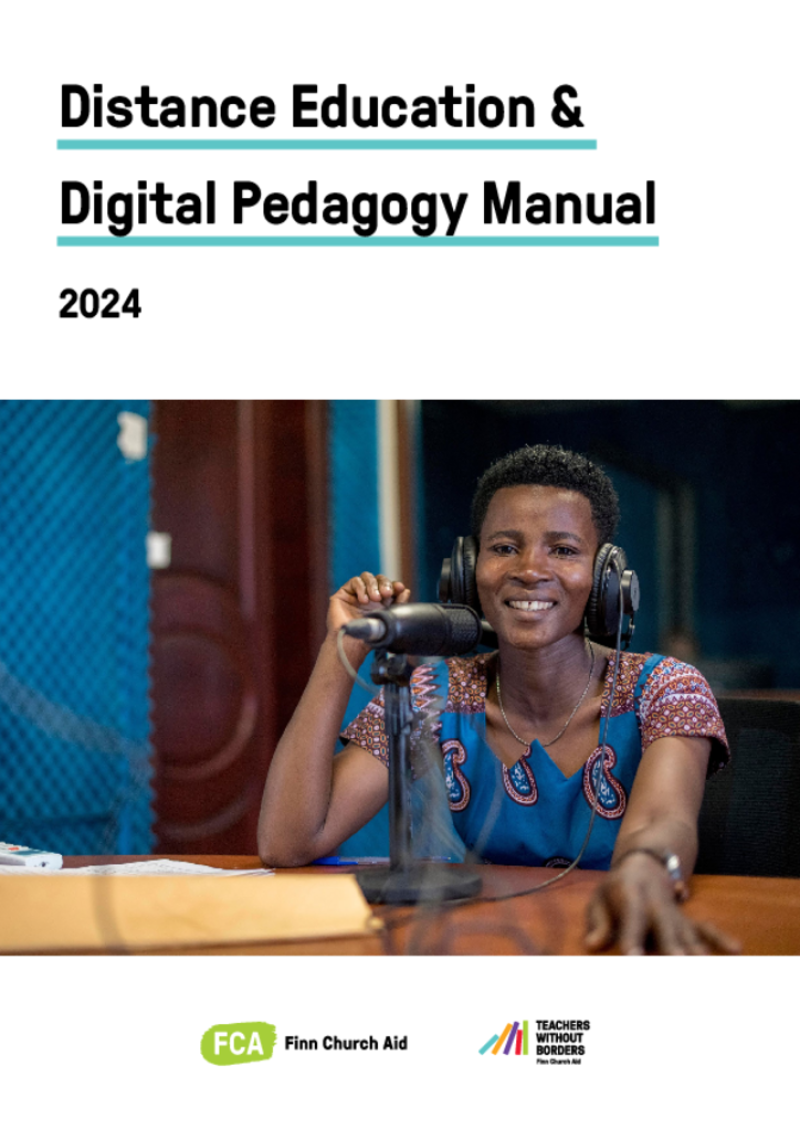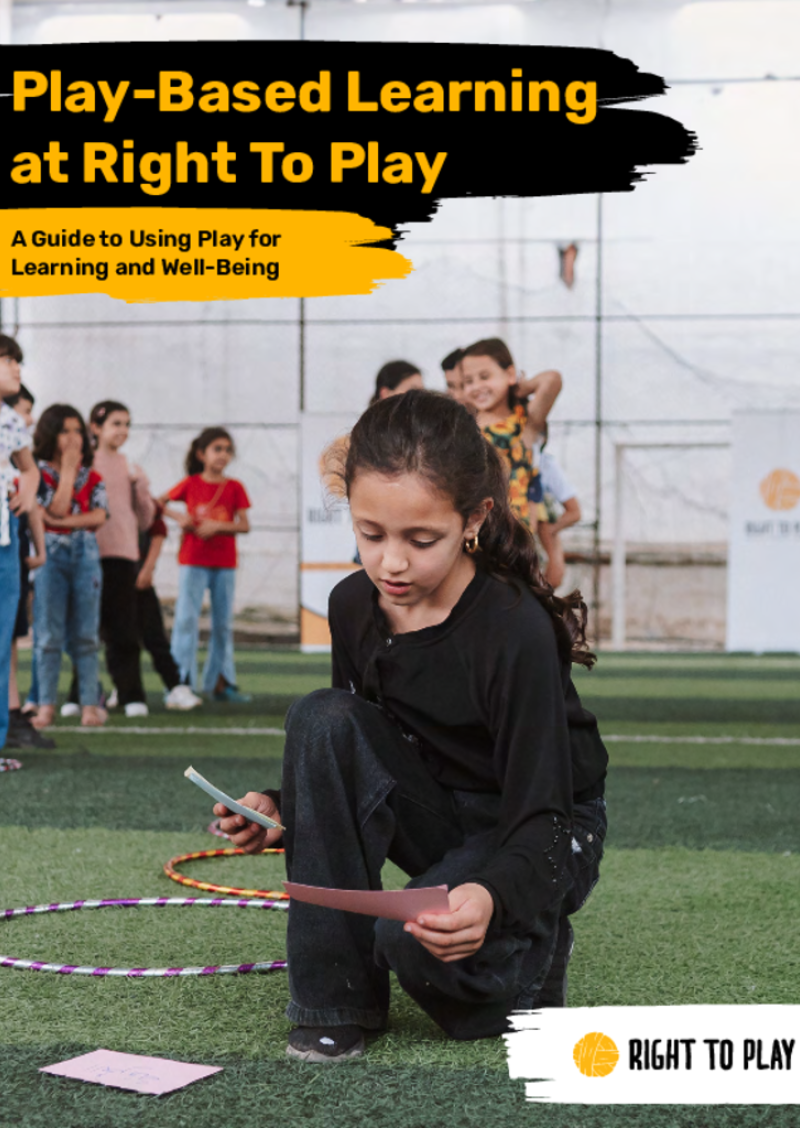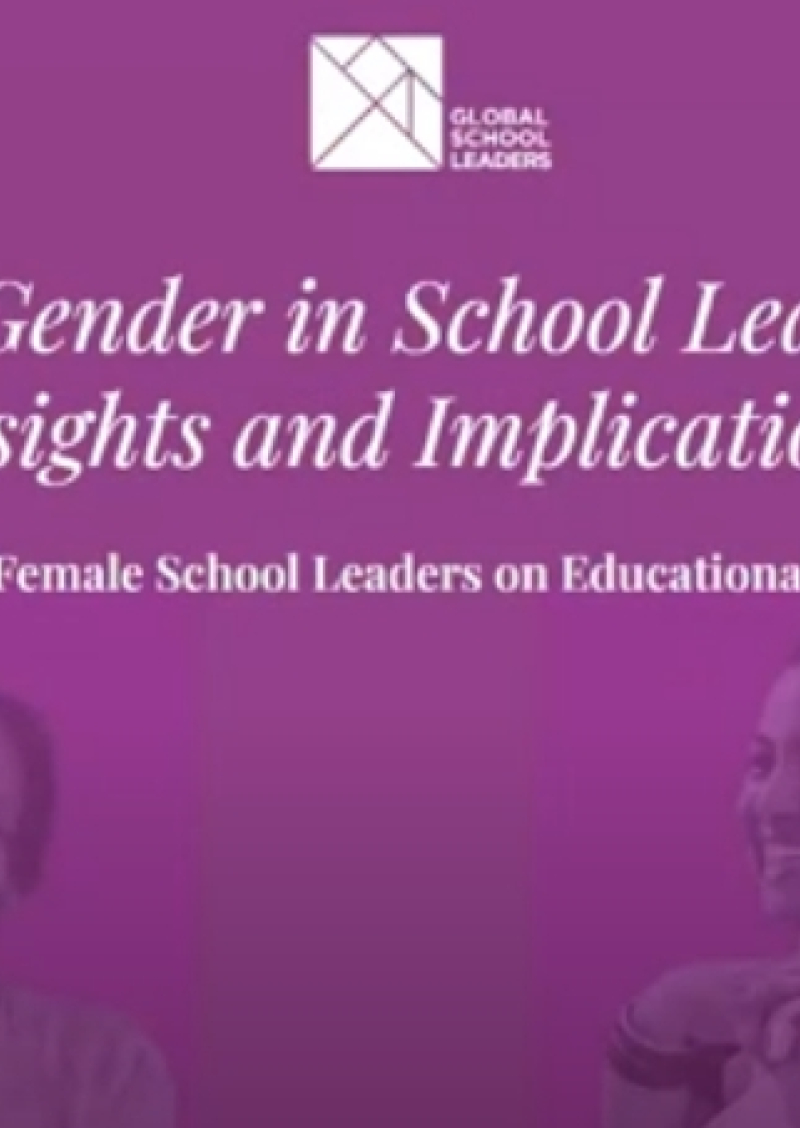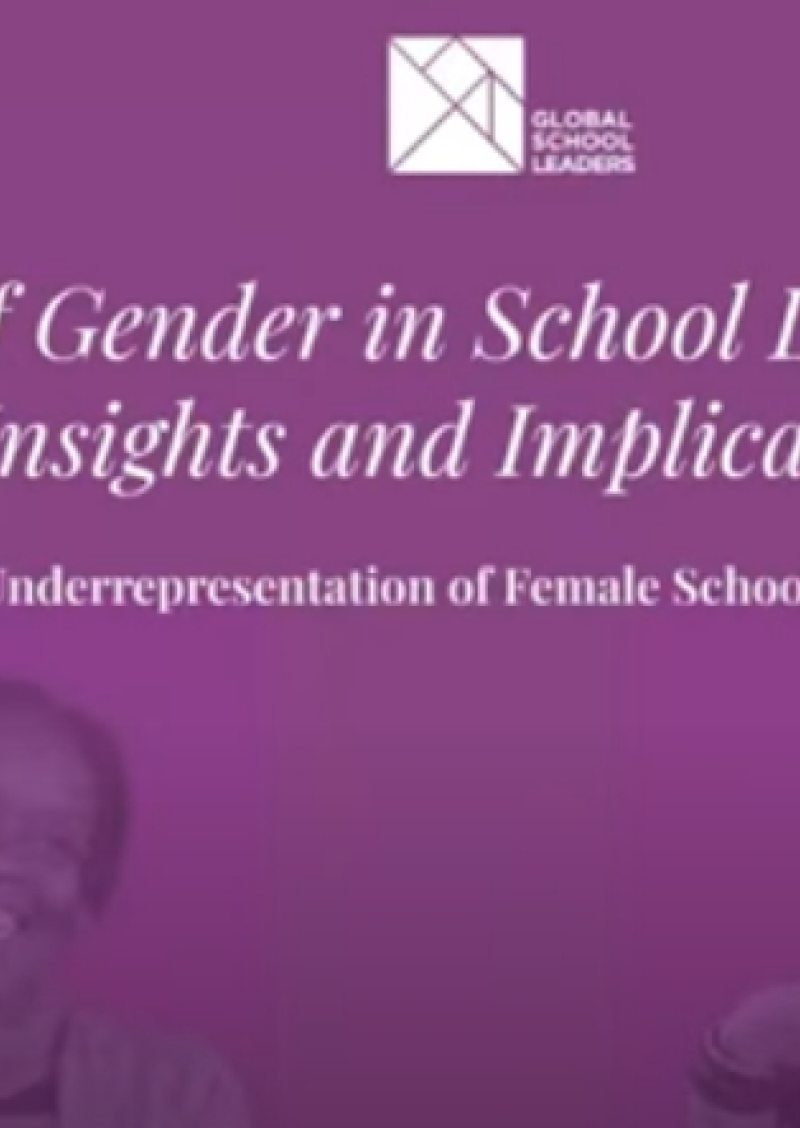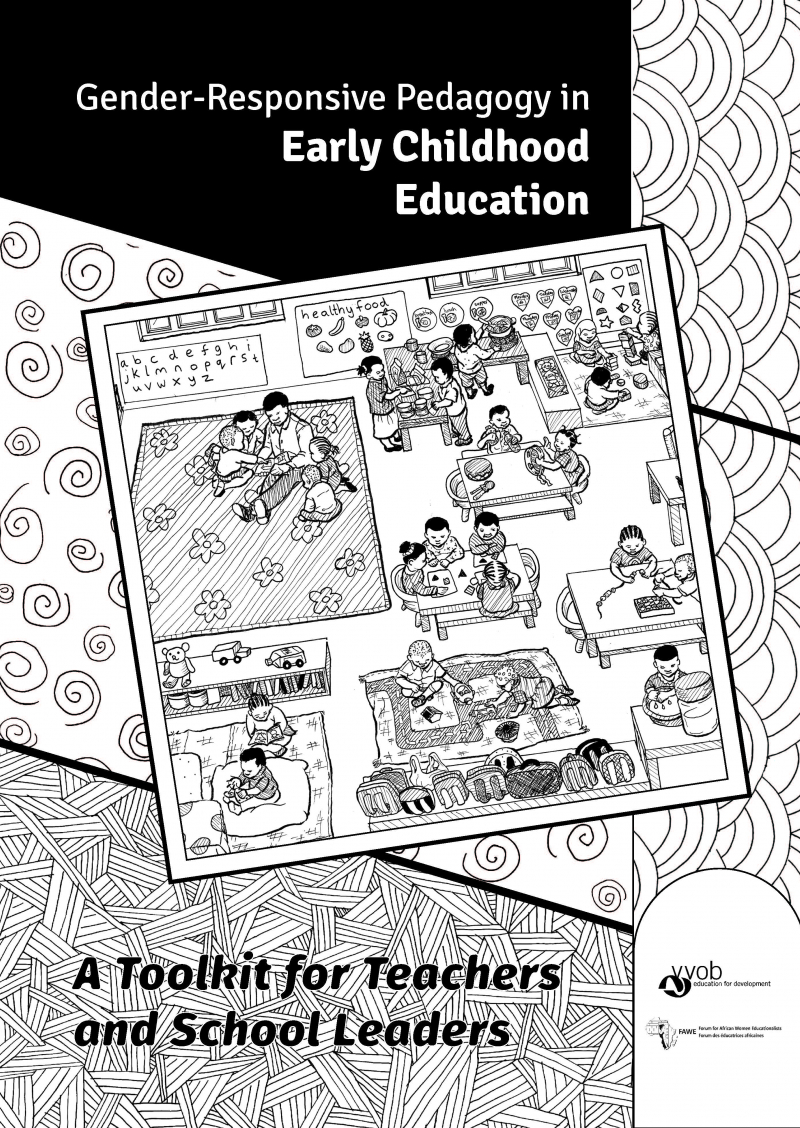Centro de Recursos para Docentes
Visualizar 1 - 17 de 17
FCA & TWB Distance Education & Digital Pedagogy Manual
This teacher training manual on Distance Education & Digital Pedagogy supports teachers and other education personnel’s continuous professional development in pedagogically high-quality distance education and remote learning especially in diverse, low resource contexts and is adaptable for use anywhere in the world.
The manual has been developed by Finn Church Aid (FCA) and Teachers Without Borders (TWB) Finland. The development of the training materials began already in 2020 as a response to the school lock-down situations caused by the COVID-19 pandemic, when teachers and learners quickly had to adapt to remote education modalities. Even though the pandemic has subsided, the need for quality distance education prevails. Ensuring the continuity of learning for all learners is critical in all contexts, even and especially during crisis situations.
The training manual consists of eight (8) training modules that can be used flexibly:
- Distance Education,
- Distance Education Modalities,
- Pedagogy of Digital and Distance Education,
- Psychosocial and Emotional Wellbeing,
- Learner-Centred Methods in Distance Education,
- Home Support – Parents and Caregivers’ Role and Collaboration,
- Inclusive Education, and
- Assessment and Evaluation.
The content design allows the trainer or facilitator to pick individual modules or sessions and adapt the training content according to the context and target group’s needs.
We hope you find it useful!
Differentiated Instruction in Displacement Contexts. Workshops Facilitation Guide
In this guide, there are prompts to support exploration of the content and application to the local context. There are also tips to support educators as they make space and time for professional learning within their busy and, often, stressful lives. Finally, this guide offers some advice regarding online, and/or other technological aspects, of this training.
The Quality Holistic Learning Project (QHL), of which this face-to-face workshop is one element, aims to prepare educators to deliver high-quality lessons which support holistic learning for children and youths of diverse backgrounds (refugee, migrant, and/or citizen) within host country, displacement, and crisis contexts. They define quality holistic learning as that which attends to:
- academic, cognitive, and identity development,
- social and emotional learning, and
- mental/psychosocial and physical well-being and which delivers: positive schooling experiences, ● feelings of belonging and safety, growth and development, and equitable outcomes for all learners.
Introduction to Asset Based Pedagogies in Displacement Contexts Workshops Facilitation Guide
This manual is intended to support the delivery of one full day workshop on the topic of supporting Quality Holistic Learning in crisis contexts through the implementation of asset-based pedagogical tools and activities and through sustaining safe and secure learning spaces. The workshops are the result of the insightful contributions of a committed team of teachers and educators from Kenya, Lebanon, and Niger.
The Quality Holistic Learning Project (QHL), of which this face-to-face workshop is one element, aims to prepare educators to deliver high-quality lessons which support holistic learning for children and youths of diverse backgrounds (refugee, migrant, and/or citizen) within host country, displacement, and crisis contexts. We define quality holistic learning as that which attends to:
- academic, cognitive, and identity development,
- social and emotional learning, and
- mental/psychosocial and physical well-being and which delivers: positive schooling experiences, feelings of belonging and safety, growth and development, and equitable outcomes for all learners.
Integrating SEL & PSS into Lessons for Quality Holistic Learning
This open, self-paced course, Integrating SEL & PSS into Lessons for Quality Holistic Learning, was designed with a team of teachers working with refugee and vulnerable learners across Lebanon. It is intended to build upon previous learning related to social and emotional learning (SEL) and psychosocial support (PSS) to provide teachers with the confidence to critically evaluate activities, adapt them to their local context, and assess impact on student learning and well-being.
Educators who complete this online course will be able to:
- Define the concepts PSS and SEL.
- Integrate PSS and SEL in lesson plans.
- Create safe spaces for displaced learners, refugees, and other vulnerable students.
- Reflect on tools and teaching pedagogies when implementing PSS and SEL activities.
- Evaluate their adaptation and implementation of PSS and SEL activities.
It will take 8-10 hours, on average, to complete this course. It is entirely self-paced. There is a micro-credential opportunity shared at the end of the course for those interested in demonstrating their competency and earning a digital micro-credential and badge.
Asset (Strength) Based Pedagogies for Quality Holistic Learning
This open, self-paced course, Asset (Strength) Based Pedagogies for Quality Holistic Learning, was designed by teachers for teachers, especially those working with refugee and vulnerable learners around the world. It is intended to provide an overview of key terminology, concepts, and practices related to asset (or strength) based pedagogies.
Educators who complete this short online course will:
- gain a working understanding of what asset-based pedagogies are and why they are important
- be able to identify ways in which asset-based pedagogies can be applied in the classroom
- examine how to apply asset-based pedagogies in the context of their own work
It will take 3-4 hours, on average, to complete this course. A certificate of participation will be issued upon successful completion. Thank you for your interest and for your commitment to your professional learning and to teaching!
A handbook for use offline is currently being developed, as a parallel tool for learning about asset-based pedagogies. Please contact jkasper@ceinternational1892.org to discuss piloting of this additional material.
Introduction to SEL & PSS for Quality Holistic Learning
This open, self-paced course, Introduction to Social-Emotional Learning & Psychosocial Support for Quality Holistic Learning, was designed with a team of teachers working with refugee and vulnerable learners in Niger. It is intended to provide an overview of key terminology, concepts, and practices related to social-emotional learning and psychosocial support.
Educators who complete this online course will:
- understand the importance of creating a safe and inclusive environment for children's well-being and learning in emergency situations
- understand the basic principles of Psychosocial Support (PSS) and Social-Emotional Learning (SEL) and their role in supporting students in displaced contexts, especially considering the educator's unique students and learning context
- integrate simple and applicable PSS interventions and SEL activities into their lesson plans to ensure Quality Holistic Learning
It will take 4-5 hours, on average, to complete this course. A certificate of participation will be issued upon successful completion. Thank you for your interest and for your commitment to your professional learning and to teaching!
An offline, PowerPoint guided workshop series, upon which this course is based, is available for training purposes as well. Please contact jkasper@ceinternational1892.org to discuss piloting of that workshop material.
A Guide to Using Play for Learning and Well-Being
Right To Play uses a variety of approaches to play to support children’s learning, development, and well-being, including sports, music, theatre, art, and play-based learning.
This document focuses on the play-based learning methodology and approach, and how it can be used for learning and development goals related to Right To Play’s core programmatic areas: early childhood care and education, primary education, gender equality and girls’ well-being, and psycho-social support.
Play & resilience: a toolkit for teachers, caregivers, and other stakeholders
Play is an easy, natural and universal practice that builds resilience. Play comes naturally to all children- and is a seemingly simple and light-hearted phenomenon. The power of play as a pathway to building resilience needs to be leveraged to provide children with the opportunity to further explore play in their home and school environments.
This toolkit is therefore premised on the objectives to build the capacity of various stakeholders such as caregivers/teachers, school managers, curriculum planners and policy makers who are key actors in the process of growth and development of children. It is also aimed at equipping these stakeholders with the knowledge and pedagogical skills to translate research, policy and curriculum to practical knowledge and activities for children in the school environment. The toolkit offers directions for facilitators who will be working with caregivers/teachers using the materials and resources provided and other relevant materials available in an environment where it will be used.
Pedagogies of Belonging: Educators Building Welcoming Communities in Settings of Conflict and Migration
What would it take to ensure that all young people have access to learning that enables them to feel a sense of belonging and prepares them to help build more peaceful and equitable futures? This is a question we have found educators in contexts of conflict and migration ask of themselves each day. And each day, in classrooms around the world, educators are acting in response to this question.
Educators are figuring out what to teach, ways to teach, and how to foster relationships of learning and belonging.
We learn from educators how they create space for dissent, for dialogue, for trust, for new identities, for future-building, and how they envision and build newly imagined and welcoming communities.
Pedagogies of belonging, featured in this book and in its title, emerge from these ways of thinking and acting by educators. We see across educators that what they teach, how they teach, and why they teach in the ways they do come together to enable all young people to feel a sense of belonging and prepare them to help build more peaceful and equitable futures.
This book is about educators and for educators. It is about the practices educators have developed to create welcoming communities in settings of conflict and migration. Each chapter is a “microportrait” of one educator who we have come to know by spending time in their classroom and school.
We focus on the why and the how of practices educators use. We show, through text and art, how educators learn about their students’ experiences, needs, and desires. We describe how educators develop practices to meet these learning and belonging goals. And we recognize how educators address struggles that necessarily arise in this work. We hope the practices give us each ideas to try out in our own classrooms, schools, and other educational sites.
Each microportrait is grounded in research about educator practices. Authors of the microportraits came to know the educators through research projects that included interviews, observations, and sometimes participatory methods. Each project was at least a few months and at times spanned many years. The microportraits include links to articles that can support deeper learning about the contexts and practices of the educators.
This book is a collective project, and we welcome your participation. The intention of this book is that it lives and grows to include more microportraits over time and more patterns of practices that may emerge. Please be in touch with suggestions, to share your experiences with the practices of these educators, or to contribute a microportrait to the collection.
Equity in Education: The Role of Women Leaders
Global School Leadership Webinar featuring Kathy Bartlett, Suchetha Bhat, Olanrewaju Oniyitan, Kathleen Chew, and V. Jayalakshmi on the topic of Equity in Education: The Role of Women Leaders.
Role of Gender in School Leadership PART II: Impact of Female School Leaders on Educational Outcomes
Drawing from the 2024 Evidence Review on gender in school leadership (available here), the two-part webinar series “Role of Gender in School Leadership" aims to offer deep insights into effective strategies for fostering gender equity in educational leadership. Watch this webinar as practitioners, researchers and policymakers from the global education space unpack the potential of improving female representation in school leadership to enhance educational outcomes and foster inclusive learning environments. In this webinar Aashti Zaidi Hai talks to Eline Versluys, Sister Zeph, Franco Mosso, and Veronica Cabezas.
Role of Gender in School Leadership PART I : Underrepresentation of Female School Leaders- PART I
Drawing from the 2024 Evidence Review on gender in school leadership (available here), the two-part webinar series “Role of Gender in School Leadership" aims to offer deep insights into effective strategies for fostering gender equity in educational leadership. Watch this webinar with professionals, researchers, and policymakers to deep dive into the underrepresentation of female school leaders and explore actionable strategies for overcoming systemic barriers hindering gender equity in school leadership roles, and discuss ways to dismantle them. In this webinar Sonakshi Sharma talks with Vongai Nyahunzvi, Gala Díaz Langou y Michael Boakye-Yiadom.
Gender-responsive pedagogy in early childhood education. A toolkit for teachers and school leaders
The toolkit offers an introduction to gender-responsive pedagogy in early childhood education and serves as a practical guide that can be adapted to any context and the related needs. It provides teachers at early education practical tips to ensure they are able to offer children a learning environment that is free of prejudice and stereotypes. It is a source of ideas that individual teachers and school leaders can put to immediate use in their classrooms and schools. The toolkit was pre-trialled in three countries: Rwanda, South Africa and Zambia, and it can be contextualised for implementation in different African countries.
Docentes en contextos de crisis: Coaching entre pares
En contextos de crisis, en los que muchos docentes carecen de formación o tienen una formación insuficiente, lo que más se necesita es un apoyo continuado; sin embargo, el desarrollo profesional en estos contextos es esporádico, de calidad variada y a menudo carece de apoyo de seguimiento tras la formación. Para hacer frente a esta falta de apoyo profesional de calidad para los docentes en contextos de crisis, el Grupo de Trabajo de Docentes en Contextos de Crisis (TiCC) publicó en marzo de 2016 el paquete formativo Formación para Docentes de Primaria en Contextos de Crisis, una formación basada en competencias diseñada específicamente para los docentes que trabajan en contextos de emergencia.
Tras la publicación del paquete de formación, el TiCC comenzó a trabajar en materiales complementarios de coaching entre pares. La formación entre pares es un desarrollo profesional continuo dirigido por docentes para docentes. El apoyo continuo que los docentes pueden prestarse mutuamente a través de la formación entre pares ayuda a los docentes a realizar cambios positivos sostenidos en su práctica docente. El coaching entre pares proporciona este apoyo a través de dos actividades principales: 1) Círculos de aprendizaje de docentes (CAD), y 2) Observaciones en el aula.
Los principales componentes son:
- La guía para la facilitación
- Caja de herramientas de coaching entre pares, nivel 1 - solo CAD
- Caja de herramientas de coaching entre pares, nivel 2 - CAD y observaciones en el aula
Mobile mentoring for primary school teachers in crisis contexts
The following curriculum provides the content for a new mobile mentoring initiative developed to accompany the Teachers in Crisis Contexts Working Group ‘Training for primary school teachers in crisis contexts’ (https://trc-dev.gn.apc.org/professional-development-materials-and-opportunities/training-primary-school-teachers-crisis). The material is intended to provide additional layers of instructional and emotional support via mobile technology to inexperienced and under trained teachers in the most difficult of teaching contexts.
It has been designed to support both the Initial Training Pack and the Extended Training Pack and builds on the competency areas covered in both sets of trainings; ‘Teacher Role and Well Being’, ‘Child Protection, Well-being and Inclusion’, ‘Pedagogy’, ‘Curriculum and Planning’. The content provides teaching tips, motivational messages, reflection and discussion questions, plus images and video suggestions.
Training for primary school teachers in crisis contexts
The training pack responds to a critical gap in open source, competency based teacher training materials that provide coverage of foundational knowledge and skills required by teachers in crisis contexts, where teacher training is often limited to ad hoc workshops. The pack provides the basis for an in-service training program which can be used in its entirety to prepare unqualified teachers, but is also flexible enough for adaptation and use of selected modules or sessions according to the contextual needs of teachers. The pack provides foundational teacher training content on Teacher’s Role & Well-being; Child Protection, Well-being & Inclusion; Pedagogy; Curriculum & Planning; and Subject Knowledge.
